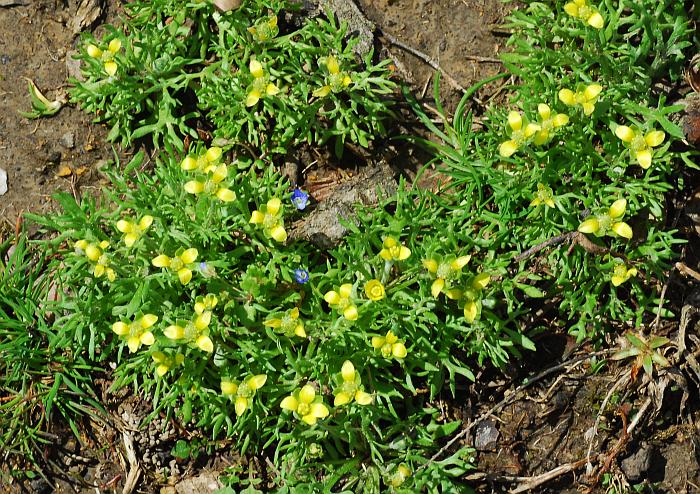Ceratocephalus testiculatus (Crantz) Roth
Bur Buttercup

Introduced
CC = *
CW = 5
MOC = 7
© SRTurner
Ceratocephalus testiculatus (Crantz) RothBur Buttercup | |
 |
Introduced CC = * CW = 5 MOC = 7 |
© SRTurner |
|
Family - Ranunculaceae Habit - Annual forb, stemless.
Stems - Absent. Leaves - All in basal rosette, 0.9-3.8 cm long, 0.5-1.5 cm wide, 1-2 times dissected, broadly spatulate in outline, the ultimate segments linear, entire, blunt pointed at the tip, the surfaces sparsely to densely and finely woolly.
Inflorescences - Solitary flowers on long, hairy stalks. Flower - Actinomorphic, perfect, the stalk 3-7 cm long, sparsely to densely and finely woolly. Sepals 5, 3-6 mm long, 1-2 mm wide, green, sometimes almost hidden in the dense white woolly hairs, persistent at fruiting. Petals 5, 3-5 mm long, 1-3 mm wide, yellow. Stamens not showy, the anthers yellow. Pistils 20-50, each with 1 ovule. Style present, persistent.
Fruit - Ellipsoid achenes clustered in cylindrical heads, these 9-16 mm long and 8-10 mm wide; the main body of each fruit 1.6-2.0 mm long, 1.8-2.0 mm wide, the fruit wall thick, not veined, woolly-hairy, the beak 3.5-4.5 mm long, lanceolate. Receptacle becoming elongated and cylindrical in fruit, glabrous.
Flowering - March - May. Habitat - Lawns or other disturbed areas, picnic areas, campgrounds. Origin - Native to Eurasia. Lookalikes - None close. Other info. - This small but easily identified species is uncommon in Missouri, currently reported from only seven counties. It is far more common west of the Rocky Mountains. Its abundance in Missouri appears to be slowly increasing. Botanical references describe the flowers as being five petaled, but it is common to see flowers with fewer petals. The plant is found in highly disturbed areas, where it tends to form dense mats. It is considered invasive in some western areas of the country. Photographs taken at Kirkwood City Park, St. Louis County, MO, 4-2-2019 (SRTurner). |